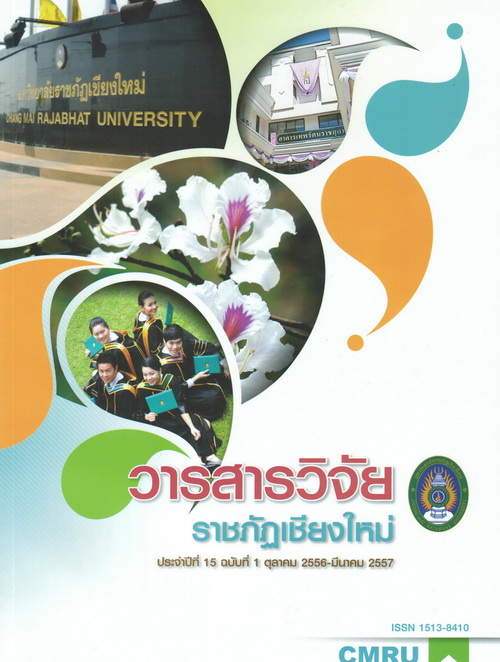การพัฒนาระบบจัดการองค์ความรู้ดนตรีพื้นบ้านมังคละในพื้นที่ ภาคเหนือตอนล่าง เพื่อการส่งเสริมและเผยแพร่ศิลปวัฒนรรรมไทย โดยใช้ออนโทโลยีและวิกิพีเดียเชิงความหมาย
DOI:
https://doi.org/10.14456/rcmrj.2014.96167Keywords:
ระบบจัดการองค์ความรู้, ดนตรีพื้นบ้านมังคละ, ออนโทโลยี, วิกิพีเดียเชิงความหมาย, ภาคเหนือตอนล่าง, Knowledge Management System, Mangkla Folk Music, Ontology, Semantic Wikipedia, Lower-Northern RegionAbstract
การวิจัยนี้มีวัตถุประสงค์เพื่อหารูปแบบฐานความรู้ออนโทโลยีเรื่องดนตรีพื้นบ้านมังคละในพื้นที่ภาคเหนือตอนล่างจากปราชญ์และผู้เชี่ยวชาญ โดยใช้เทคนิคการรวบรวมข้อมูลแบบสร้างเครือข่ายสโนว์บอล และนำมาพัฒนาระบบจัดการองค์ความรู้ดนตรีพื้นบ้านมังคละโดยใช้ออนโทโลยีและวิกิพีเดียเชิงความหมาย เพื่อให้ประซาซนและนักเรียนในรายวิชาหลักสูตรท้องถิ่นได้เข้าถึงองค์ความรู้ผ่านเครือข่ายอินเทอร์เน็ต จากนั้นจะทำการประเมินความพึงพอใจผู้ใช้ที่มีต่อระบบจัดการองค์ความรู้ดนตรีพื้นบ้านมังคละ ซึ่งผลจากการดำเนินงานวิจัยและพัฒนาในครั้งนี้ สามารถสรุปสาระความรู้ที่ค้นพบ ได้แก่ 1) การหารูปแบบฐานความรู้ออนโทโลยืเรื่องดนตรีพื้นบ้านมังคละในพื้นที่ภาคเหนือตอนล่าง จากปราชญ์ผ้เชี่ยวชาญและครูผู้คุมวงดนตรี ที่มีประสบการณ์ไม่ตากว่า 10 ปี จำนวน 5 คน โดยใช้เทคนิคการรวบรวมองค์ความรู้แบบสร้างเครือข่ายสโนว์บอล และทำการยืนยันความจำเป็นของรายการองค์ความรู้กับปราชญ์ผู้เชี่ยวชาญ ครูผู้คุมวงดนตรี และนักเรียนที่เรียนในหลักสูตรท้องถิ่นในพื้นที่ภาคเหนือตอนล่าง ที่ทำการเลือกแบบเจาะจงจำนวนทั้งสิ้น 52 คน แล้วนำข้อมูลมาแปลผลโดยใช้ค่าร้อยละ ซึ่งพบว่า สาระความรู้ที่ควรนำเสนอในฐานความรู้จำแนกได้ 5 ด้าน ได้แก่ ด้านประวัติความเป็นมา ด้านเอกลักษณ์เฉพาะตนในการละเล่น ด้านพิธีกรรมการไหว้ครู ด้านคติความเชื่อ และด้านรูปแบบการสร้างเครือข่ายระหว่างวงดนตรี และรายละเอียดเนื้อหาของแต่ละประเด็นความรู้ทั้ง 5 ด้านในภาพรวม กลุ่มตัวอย่างมีความคิดเห็นว่ามีความจำเป็นที่จะนำเสนอผ่านระบบจัดการฐานความรู้อยู่ในระดับมากและมากที่สุด จากนั้นผู้วิจัยนำผลสรุปความต้องการและความจำเป็นของรายการองค์ความรู้การละเล่นดนตรีพื้นบ้านมังคละของผู้ใข้ มาสร้างฐานความรู้ออนโทโลยีด้วยโปรแกรม Hozo เพื่อสร้างความสัมพันธ์ของโหนดข้อมูล ได้จำนวนทั้งสิ้น 51 โหนด จำแนกได้เป็น 5 ระดับชั้นข้อมูล และตรวจทานความถูกต้องของโครงสร้างฐานความรู้ออนโทโลยืตามกฎ RDFs จากผู้เชี่ยวชาญกลุ่มที่ใข้รวบรวมองค์ความรู้ข้างต้น พบว่า โครงสร้างฐานความรู้ออนโทโลยืที่สร้างฃึ้นมีความถูกต้องร้อยละ 99 2) การพัฒนาระบบจัดการองค์ความรู้ดนตรีพื้นบ้านมังคละโดยใช้ออนโทโลยืและวิกิพีเดียเชิงความหมาย โดยใช้ภาษา PHP5 และไลบารี่ RAP API for PHP เป็นส่วนช่วยติดต่อเว็บวิกิพีเสียกับฐานความรู้ออนโทโลยืดนตรีพื้นบ้านมังคละตามหลักการเชิงวัตถุ พบว่าฟ้งก์ชันการทำงานของระบบจัดการองค์ความรู้ที่สอดคล้องกับความต้องการของผู้ใช้ที่ได้พัฒนาขึ้นประกอบด้วย 4 ส่วน ได้แก่ ส่วนนำเช้าโครงสร้างออนโทโลยื ส่วนจัดการโครงสร้างโหนดบนออนโทโลยีให้เป็นภาษาไทย ส่วนแม่แบบกรอกและแสดงองค์ความรู้บนวิกิพีเสียเซิงความหมาย และส่วนกำหนดคำสั่งอินไลน์คิวรี่ เพื่อรองรับการให้บริการสืบค้นข้อมลเซิงความหมาย และ 3) การประเมินความพึงพอใจของผใข้ที่มีต่อระบบจัดการองค์ความรู้ดนตรีพื้นบ้านมังคละ แล้วนำข้อมูลที่รวบรวมได้มาแปลผลด้วยค่าร้อยละ พบว่าผู้ใข้ที่ทำการเสือกแบบเจาะจงในสถานะผู้จัดการข้อมูลและผู้ใข้ทั่วไปจำนวนทั้งสิ้น 100 คน มีความคิดเห็นว่าประสิทธิภาพการทำงานของระบบในภาพรวมทั้ง 5 ด้านอยู่ในระดับดี
DEVELOPMENT KNOWLEDGE MANAGEMENT SYSTEM FOR MANGKLA FOLK MUSIC IN LOWER NORTHERN AREA FOR PROMOTE AND DISTRIBUTE OF THAI CULTURE USING ONTOLOGY AND SEMANTIC WIKIPEDIA
This research aimed to find an ontological model of the knowledge base regarding Mangkla folk music featured in the Lower Northern Region from savants and experts. The data were collected based on Snowball Sampling Technique and developed into a Mangkla folk music knowledge management system using Ontology and Semantic Wikipedia to enable the public and local curriculum students to gain access to the body of knowledge via the Internet network. Satisfaction of the users towards the Mangkla folk music knowledge management system was then evaluated. The findings could be concluded as follows: 1) The ontological model of the knowledge base regarding Mangkla folk music in the Lower Northern Region was created based on the information from 5 experts and band leaders with 10 years of experience or more using Snowball Sampling Technique. The necessity of the Mangkla folk music knowledge inventory was checked and confirmed by the experts and band leaders together with 52 local curriculum students, from purposive sampling, in the Lower Northern Region. The data were then processed into percentage. It was found that there were 5 categories of knowledge that should be presented: history, performers’ idiosyncratic uniqueness, Wai-Kru ceremony, myths and beliefs, and band networking models.in general, the sample group was of the opinion that the contents of the 5 knowledge categories should be presented through the knowledge management system at the high and highest levels. Next, the researcher designed the ontological knowledge base from the data regarding the users’ needs and the necessity of the knowledge inventory of Mangkla folk music performance. The design employed Hozo program to create relationship among the 51 data nodes categorized into 5 data levels. The validity of the ontological knowledge-base structure was verified by the same group of experts and evaluated at 99 percent; 2) The development of the Mangkla folk music knowledge management system using Ontology and Semantic Wikipedia in PHP5 language and RAP: API for PHP library to help connect the Wikipedia web to the Mangkla folk music knowledge base according to the object-oriented principles revealed that the operation functions of the knowledge management system corresponding to the users’ needs comprised 4 parts: ontological structure input, Thai-language ontological node structure management, model of knowledge input and display on Semantic Wikipedia, and inline-query command supporting semantic search; and 3) The users’ satisfaction towards the Mangkla folk music knowledge management system was surveyed and the data were processed into percentage. It was found that the 100 users purposively selected from the data managers and general users were of the opinion that the efficiency of the system in the 5 categories was at the high level.
Downloads
Downloads
How to Cite
Issue
Section
License
1. Articles, information, content, images, etc published in the “Community and Social Development Journal” are copyrighted by the Community and Social Development Journal, Chiang Mai Rajabhat University. In order to properly distribute the articles through print and electronic media, the authors still hold the copyright for the published articles under the Creative Commons Attribution (CC BY) license, which allows the re-distribution of the articles in other sources. References must be made to the articles in the journal. The authors are responsible for requesting permission to reproduce copyrighted content from other sources.
2. The content of the articles appearing in the journal is the direct responsibility of the article authors. The editorial board of the journal does not necessarily agree with or share any responsibility.














